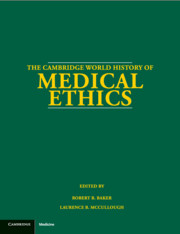Book contents
- Frontmatter
- PART I AN INTRODUCTION TO THE HISTORY OF MEDICAL ETHICS
- PART II A CHRONOLOGY OF MEDICAL ETHICS
- PART III DISCOURSES OF MEDICAL ETHICS THROUGH THE LIFE CYCLE
- PART IV THE DISCOURSES OF RELIGION ON MEDICAL ETHICS
- PART V THE DISCOURSES OF PHILOSOPHY ON MEDICAL ETHICS
- PART VI THE DISCOURSES OF PRACTITIONERS ON MEDICAL ETHICS
- 19 The Discourses of Practitioners in Africa
- 20 The Discourses of Practitioners in India
- 21 The Discourses of Practitioners in China
- 22 The Discourses of Practitioners in Japan
- 23 The Discourses of Practitioners in Ancient Europe
- 24 The Discourses of European Practitioners in the Tradition of the Hippocratic Texts
- 25 The Discourses of Practitioners in the Ninth- to Fourteenth-Century Middle East
- 26 The Discourses of Practitioners in Medieval and Renaissance Europe
- 27 The Discourses of Practitioners in Sixteenth- and Seventeenth-Century Europe
- 28 The Discourses of Practitioners in Eighteenth-Century France and Germany
- 29 The Discourses of Practitioners in Eighteenth-Century Spain
- 30 The Discourses of Practitioners in Eighteenth-Century Britain
- 31 The Discourses of Practitioners in Eighteenth-Century North America
- 32 The Discourses of Practitioners in Nineteenth- and Twentieth-Century France
- 33 The Discourses of Practitioners in Nineteenth- and Twentieth-Century Spain
- 34 The Discourses of Practitioners in Nineteenth- and Twentieth-Century Germany
- 35 The Discourses of Practitioners in Eighteenth- to Twentieth-Century Russia and Soviet Union
- 36 The Discourses of Practitioners in Nineteenth- and Twentieth-Century Britain and the United States
- 37 The Discourses of Practitioners in the Modern and Contemporary Islamic Middle East
- PART VII THE DISCOURSES OF BIOETHICS
- PART VIII DISCOURSES ON MEDICAL ETHICS AND SOCIETY
- Appendix: Biographies: Who Was Who in the History of Medical Ethics
- Bibliography
- Index
27 - The Discourses of Practitioners in Sixteenth- and Seventeenth-Century Europe
from PART VI - THE DISCOURSES OF PRACTITIONERS ON MEDICAL ETHICS
Published online by Cambridge University Press: 28 May 2012
- Frontmatter
- PART I AN INTRODUCTION TO THE HISTORY OF MEDICAL ETHICS
- PART II A CHRONOLOGY OF MEDICAL ETHICS
- PART III DISCOURSES OF MEDICAL ETHICS THROUGH THE LIFE CYCLE
- PART IV THE DISCOURSES OF RELIGION ON MEDICAL ETHICS
- PART V THE DISCOURSES OF PHILOSOPHY ON MEDICAL ETHICS
- PART VI THE DISCOURSES OF PRACTITIONERS ON MEDICAL ETHICS
- 19 The Discourses of Practitioners in Africa
- 20 The Discourses of Practitioners in India
- 21 The Discourses of Practitioners in China
- 22 The Discourses of Practitioners in Japan
- 23 The Discourses of Practitioners in Ancient Europe
- 24 The Discourses of European Practitioners in the Tradition of the Hippocratic Texts
- 25 The Discourses of Practitioners in the Ninth- to Fourteenth-Century Middle East
- 26 The Discourses of Practitioners in Medieval and Renaissance Europe
- 27 The Discourses of Practitioners in Sixteenth- and Seventeenth-Century Europe
- 28 The Discourses of Practitioners in Eighteenth-Century France and Germany
- 29 The Discourses of Practitioners in Eighteenth-Century Spain
- 30 The Discourses of Practitioners in Eighteenth-Century Britain
- 31 The Discourses of Practitioners in Eighteenth-Century North America
- 32 The Discourses of Practitioners in Nineteenth- and Twentieth-Century France
- 33 The Discourses of Practitioners in Nineteenth- and Twentieth-Century Spain
- 34 The Discourses of Practitioners in Nineteenth- and Twentieth-Century Germany
- 35 The Discourses of Practitioners in Eighteenth- to Twentieth-Century Russia and Soviet Union
- 36 The Discourses of Practitioners in Nineteenth- and Twentieth-Century Britain and the United States
- 37 The Discourses of Practitioners in the Modern and Contemporary Islamic Middle East
- PART VII THE DISCOURSES OF BIOETHICS
- PART VIII DISCOURSES ON MEDICAL ETHICS AND SOCIETY
- Appendix: Biographies: Who Was Who in the History of Medical Ethics
- Bibliography
- Index
Summary
INTRODUCTION
Despite apparent similarities with modern medical ethics, the relationship between medicine and ethics was very different from that found in Western countries in the twenty-first century. A major factor was that no one group of practitioners achieved a monopoly or near monopoly on legitimacy. Ethics, therefore, served, among other purposes, as a weapon in the war of words between rivals in the medical marketplace. Traditional medical ethics were much in evidence especially in the writings of physicians who modeled themselves on classical authors, but, significantly, there also came into play more general ethical considerations drawn from Christianity, which had wide social currency and appeal.
The contexts within which medicine and ethics operated helped to shape the early modern relationship between medicine and ethics. Today, the role of the state is crucial. It supervises the practice of medicine directly and/or indirectly by giving to a particular group of practitioners the right to act as a profession and to police the actions of its members. State control of medicine usually involves a strong ethical component, for instance, concerning the actions of individual doctors and the use of new techniques and medicines. In early modern Europe, state control over medicine was weak, although not completely absent. The tribunals of the protomedicato in Spain, parts of Italy and in Spanish America, as well as the city colleges of physicians and guilds of surgeons and apothecaries throughout Europe, were given by the state the right to license practitioners and to supervise medical practice.
- Type
- Chapter
- Information
- The Cambridge World History of Medical Ethics , pp. 379 - 390Publisher: Cambridge University PressPrint publication year: 2008



